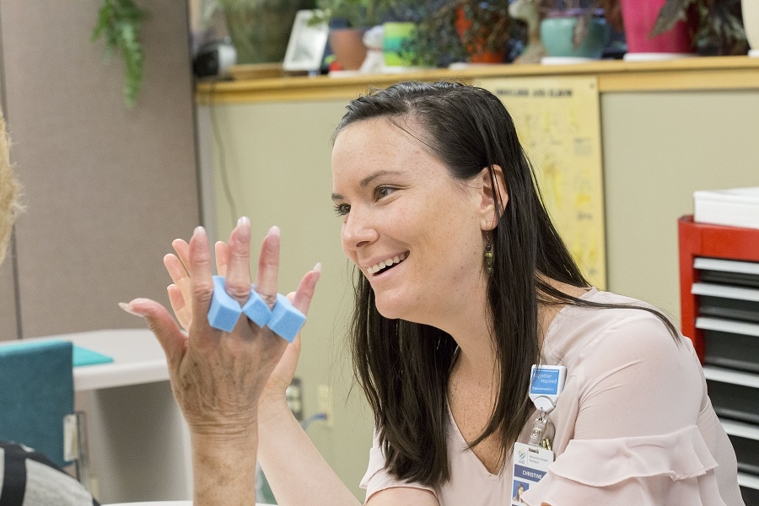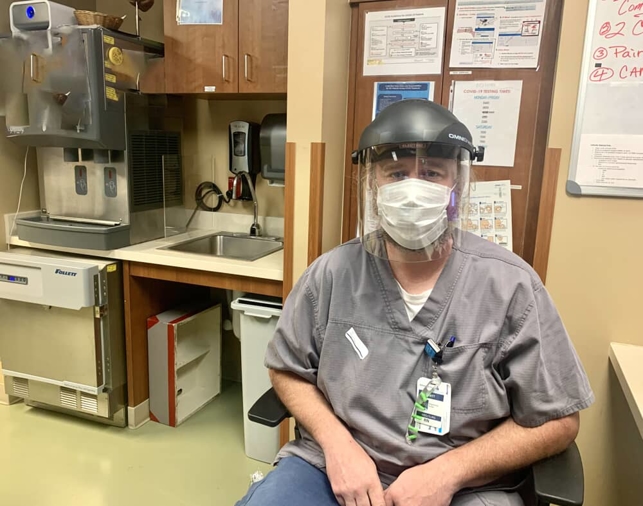Celebrating occupational therapy month
Apr 6, 2020

Every April is National Occupational Therapy Month—but do you know what an occupational therapist does? You might be surprised to learn the variety of ways they can help you.
What is an OT?
An occupational therapist (OT) is a specialist whose goal is to help patients recover, regain function or provide modification so that patients can return to their daily activities. Christine Mock, OTR/L, CHT, occupational therapist and hand therapist with Adventist Health Portland, explains that OTs work in a variety of settings. “Some specialize in acute care, some in pediatrics, some work in mental health or even in the community.
“Occupational therapy doesn’t necessarily refer to the job someone does, but what they do with their time,” Mock explains. “From a basic occupation like pulling up their pants to an advanced leisure occupation of playing basketball, we help patients to recover biomechanically as much as possible. If we can’t get patients back to 100% of their previous function through standard healing like strengthening and stretching, we help them adapt the activity or the environment so they can get back to what they love to do.”
Why should I see an OT?
AJohns Hopkins studyshowed that in patients with heart failure, pneumonia and acute myocardial infarction, OT was the only significant factor that lowered readmission rates and kept them out of the hospital. Researchers noted that this could be due to the unique and immediate emphasis OT places on the patient’s function and social support.
Mock notes that many people have a misconception that physical therapy and occupational therapy are the same thing. “Although we’re both in the family of rehab, we are much different,” Mock says. “Physical therapists are trained to think first about muscles, joints and ligaments. Occupational therapists start by thinking about each patient’s individual task and function.”
Improving function can cover a wide range—for example, one of Mock’s early jobs in OT was at a domestic violence shelter. There, occupational therapists helped survivors return to the community by teaching them to apply for jobs, prepare for an interview or navigate public transportation. “The underlying goal was to help people become independent again.”
What happens during an appointment?
In your first occupational therapy appointment, you can expect the therapist to conduct a physical exam to evaluate your loss of strength, range or sensation and gather a full health history. “We’ll want to know what your main functional concern is and what has happened, both mentally and physically, to bring you here,” says Mock.
Mock shares that the OT’s goal is to understand what you want to do that you’re currently unable to. Together, the patient and the therapist build a plan to help the patient reach their goals. “The process is very patient-driven; you will have a very active role both in setting those goals and in accomplishing them,” Mock says. A therapy plan might include an exercise program or an intervention plan that aims to help patients regain function.
A hand therapy specialty
Mock explains that her specialty, hand therapy, involves close work with a hand surgeon to help patients rehab from injuries or surgery. Some examples of injuries she sees include flexor tendon lacerations, nerve lacerations, bicep ruptures or amputations. “I had one patient who had a four-finger amputation and was in the middle of art school. Our work together was about relearning to use that hand so the patient could continue their artwork.” Mock and the art student worked on learning to use the prosthetics, even using the patient’s own art supplies to build dexterity, decrease hypersensitivity and increase confidence.
“By far the most rewarding part of my job is seeing our patients get better!” Mock says. “I love when patients come in and they’re able to participate in their everyday functions. Whether it’s tying their shoelaces or buttoning their pants, it’s so encouraging to see patients progress. I always tell people: I hate to see you go, but I love that you don’t need me anymore.”
Related articles

Stories from the frontlines: ICU nurse shares his experience of caring for COVID-19 patients
October 2, 2020
Adventist Health and Rideout Honors Aug. 2023 BE Award Recipients
September 8, 2023
Adventist Health Tillamook Celebrates Marie Brown as Associate of the Year 2023
March 21, 2024